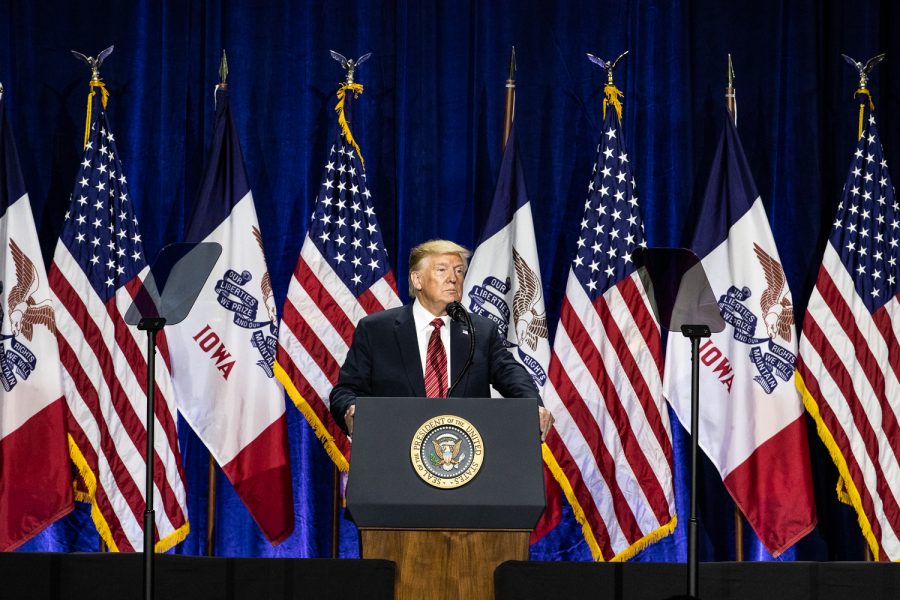Hawkeye Poll: Most Iowans oppose impeachment inquiry into President Trump
The Hawkeye Poll surveyed 1,288 registered voters in Iowa between Oct. 28 and Nov. 10, and most Iowans reported they oppose the impeachment inquiry into President Trump’s dealings with Ukraine — a higher percentage than the national average.
President Donald Trump pauses during a speech at the Iowa GOP’s America First Dinner at the Ron Pearson Center in West Des Moines on June 11, 2019.
November 19, 2019
Most Iowans oppose the impeachment inquiry into President Trump, according to a November Hawkeye Poll conducted by University of Iowa faculty and students.
Fifty-three percent of Iowans surveyed say they oppose the inquiry and 44.8 percent approve, with Republicans and Democrats being nearly uniform in their responses and independents divided over the inquiry.
The ongoing impeachment hearings into Trump — which opened to the public for the first time Nov. 13 — are investigating a July phone call to Ukraine, on which Democrats contend Trump withheld foreign aid to Ukraine in exchange for an investigation into a political rival, Democratic presidential hopeful Joe Biden. Republicans contend the president hasn’t violated any laws and was engaging in diplomacy.
The Hawkeye Poll surveyed 1,288 registered voters in Iowa by telephone between Oct. 28 and Nov. 10 and has a margin of error of +/-2.8 percentage points. The poll was conducted after House Speaker Nancy Pelosi, a California Democrat, announced a formal impeachment inquiry in September, and committees began closed-door hearings, but before witnesses began publicly testifying Nov. 13.
A plurality of the people surveyed, 47.5 percent, considered the community they live in to be rural. According to the poll, 65.7 percent of respondents who live in rural communities disapprove of the impeachment inquiry.
The poll also showed that more Iowans disapprove of the president than approve of him. Trump’s approval rating in Iowa, 45.8 percent, falls just below the percent of Iowans who disapprove of the president, 48.7 percent. A plurality of respondents, 46.8 percent, think Trump’s dealings with Ukraine were for a personal interest, and nearly 40 percent think the dealings were for a national interest.
UI Professor Frederick Boehmke, a faculty adviser for the Hawkeye Poll, and he said the amount of respondents who showed interest in a Republican challenger was one the most surprising results. Nearly two-thirds of respondents said they would like to see a strong Republican challenger to Trump, and 42.6 percent of Republicans surveyed said they had interest in seeing a Republican challenger.
“That is more than you would expect among the president’s party,” Boehmke said. He added that the number of registered Republicans who would like to see a Republican challenger does not necessarily mean that they don’t support Trump, but Boehmke said he thinks that some of those voters would rather see a nominee with less public controversy.
Boehmke said Trump’s nontraditional presidency drove pollsters to add the question about a Republican challenger and to word it in a way that avoided asking the respondents about their like or dislike for the president.
According to a separate poll, the Des Moines Register/CNN/Mediacom Iowa Poll conducted in early November, support for Trump among registered Iowa Republicans is at an all-time high, with 85 percent approving and 76 percent saying they would reelect him.
The Hawkeye Poll’s results show more Iowans oppose the impeachment inquiry than the rest of the country.
In a Nov. 19 national poll from FiveThirtyEight, nearly 48 percent of Americans support the current impeachment inquiry proceedings and 45 percent oppose it — 8 percentage points lower than respondents of the Hawkeye Poll who oppose the inquiry. Looking at polls that only asked Americans if they would support the beginning of impeachment proceedings into Trump (not asking about his removal from office), the percentage of people who supported beginning an inquiry jumped from 37 percent on Sept. 19 to 51 percent on Tuesday.
The Hawkeye Poll, conducted since 2007, deployed 250 students this year to participate in conducting the poll. The Political Science Department, the College of Liberal Arts and Sciences, and the UI Public Policy Center fund the poll.



